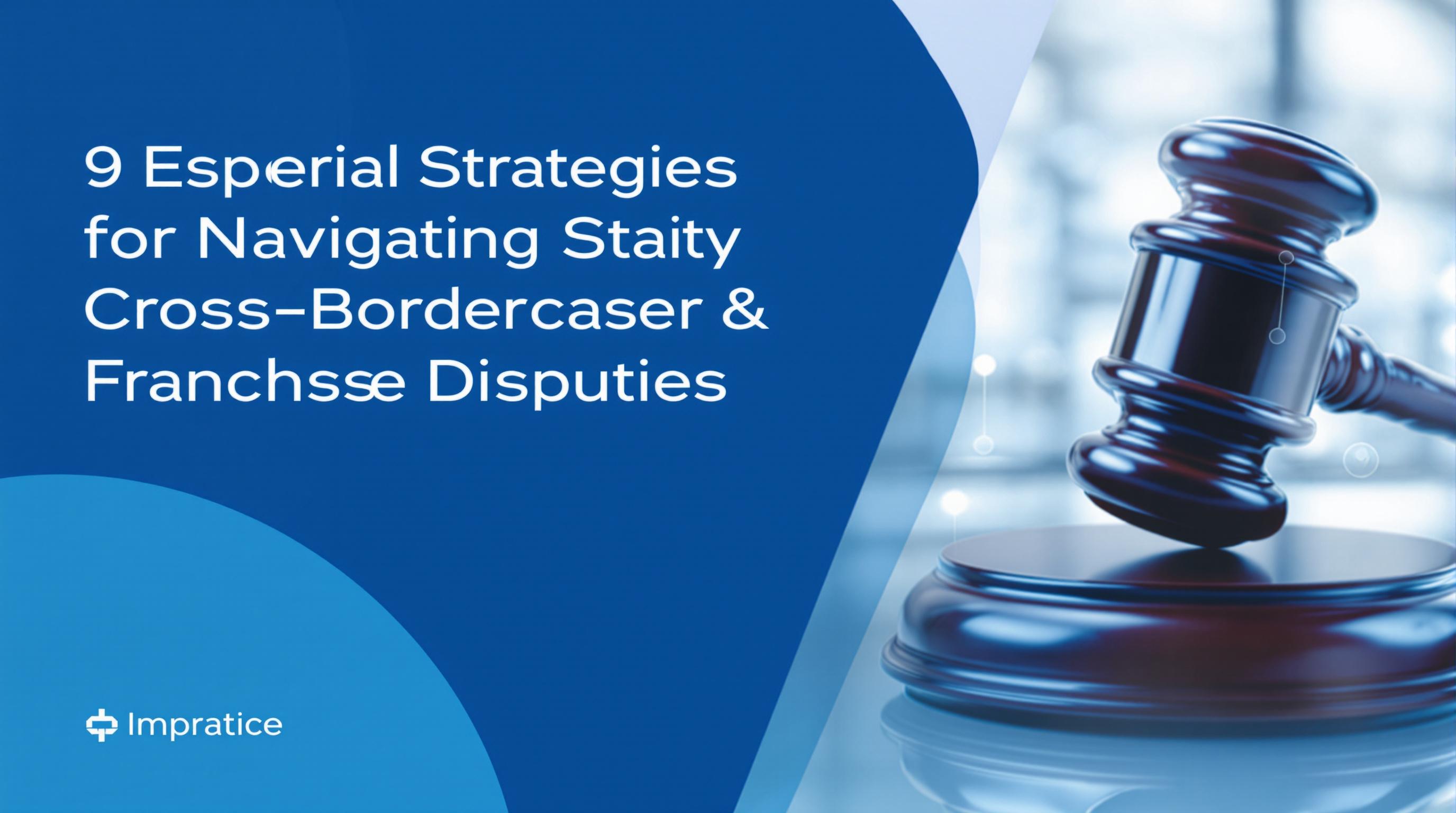Related Articles
- Unraveling the Silent Influence of Biometric Data on European Privacy Safeguards and Compliance Challenges
- Top 6 Game-Changing Franchise Analytics Platforms Launched Since 2019 for Strategic Brand Expansion
- Hidden Pitfalls in Using NDA Templates for Cross-Cultural Tech Collaborations: Lessons from Unexpected Legal Quagmires
- Top 6 Emerging AI-Powered Negotiation Tools Transforming Product Partnership Deals Since 2019
- Top 6 Under-the-Radar Business Licensing Tools Released Since 2019 That Outsmart Traditional Systems
- How Emerging Environmental Regulations Are Secretly Reshaping Small Business Structures in Unexpected Ways
Top 8 Recent AI-Powered Platforms Transforming Franchise Legal Risk Assessment and Contract Review Since 2019
Top 8 Recent AI-Powered Platforms Transforming Franchise Legal Risk Assessment and Contract Review Since 2019
Top 8 Recent AI-Powered Platforms Transforming Franchise Legal Risk Assessment and Contract Review Since 2019
The franchise business model has grown rapidly in recent years, and with it, the complexity of legal agreements and risk factors has also increased. Keeping pace with evolving regulations and ensuring thorough contract review can be a daunting task for legal teams working with franchises. Fortunately, AI-powered platforms have emerged since 2019 to revolutionize how franchise legal risk assessment and contract review are conducted. These innovative technologies increase accuracy, reduce time, and help mitigate potential liabilities associated with franchise agreements.
In this article, we explore the top eight AI-driven platforms that have transformed franchise legal processes. Each platform leverages machine learning, natural language processing, and data analytics to streamline and enhance the review and assessment of franchise contracts. By adopting these solutions, franchises and their legal advisors can ensure better compliance, reduce errors, and focus on strategic business growth rather than routine legal checks.
The following sections delve into the unique features, benefits, and impacts of each platform, providing franchise owners, legal teams, and consultants with an understanding of state-of-the-art AI tools shaping the future of franchise legal management.
1. Kira Systems
Kira Systems has become a leading AI contract analysis tool widely used in the legal ecosystem, including franchise legal risk assessment. Since its inception, Kira has evolved to handle complex contract types, including franchise agreements, by using machine learning to identify and extract relevant clauses swiftly.
The platform allows legal teams to automatically uncover risks associated with termination rights, financial obligations, and compliance clauses tailored specifically for franchises. By enabling bulk reviews and highlighting deviations from standard terms, Kira supports faster and more reliable contract due diligence.
Kira’s integration flexibility also permits franchise law practices to customize templates and risk models aligned with their unique regulatory environments. This has proven especially beneficial since 2019 as franchise markets expanded globally, demanding precision in legal risk management.
Source: Kira Systems Official Website
2. LawGeex
LawGeex utilizes AI to automate contract review processes by comparing contracts against company policies and legal standards. For franchises, LawGeex’s ability to flag non-compliance and ambiguous terms in franchise agreements significantly reduces legal risk.
The platform’s easy-to-use interface enables the rapid review of contracts, including franchise disclosure documents (FDDs) and franchise agreements. It empowers legal teams to operate more efficiently, spending less time on routine document analysis and more on strategic advice.
Since 2019, LawGeex has incorporated enhanced natural language processing techniques to better understand the nuances of franchise law, which varies by jurisdiction, thus offering context-aware reviews vital for franchise risk assessment.
Source: LawGeex Blog, 2021
3. Luminance
Luminance offers AI-powered document analysis designed to assist legal teams in highlighting risks and irregularities within complex contracts. For franchise legal work, Luminance can rapidly analyze thousands of agreements to ensure consistent compliance and identify potential problem areas.
Its intuitive machine learning algorithms recognize patterns and anomalies in contracts, flagging unusual terms in franchise contracts that could expose franchisors or franchisees to liability. This capability aids legal professionals in making informed decisions about negotiating terms or addressing risks early.
Beyond risk assessment, Luminance provides insights into contract trends and deviations, giving franchises a strategic perspective on their legal arrangements since its enhancements after 2019.
Source: Luminance Case Studies, 2020
4. eBrevia
eBrevia utilizes AI to extract data and analyze contract language to identify risk points efficiently. Franchise organizations benefit from eBrevia’s high-accuracy extraction of key provisions like renewal clauses, territory restrictions, and indemnity obligations.
The platform reduces manual contract review time while improving precision, an important factor for franchises managing numerous agreements simultaneously. eBrevia’s customizable models accommodate franchise-specific legal terminology and requirements.
Since 2019, eBrevia’s technology has incorporated advances in deep learning to enhance text extraction, enabling franchise legal teams to gain stronger insights and control over contractual risks.
Source: eBrevia Press Release, 2021
5. Clause
Clause revolutionizes contract management by enabling smart contracts with AI-enabled automation. For franchise agreements, Clause’s platform supports dynamic contracts that can automatically update or trigger actions based on compliance and performance metrics.
This innovation reduces the risk of overlooked obligations such as royalty payments or reporting deadlines that are typical in franchise contracts. By automating these processes, franchises maintain better operational and legal oversight.
The platform’s ability to integrate with existing franchise management systems has matured since 2019, helping businesses transition from static contracts to more adaptive legal frameworks.
Source: Clause White Paper, 2022
6. ThoughtRiver
ThoughtRiver provides AI-powered contract pre-screening that assesses risks upfront by analyzing the legal language in franchise contracts. This early detection allows franchises to identify potential concerns before contracts proceed to negotiations.
The platform ranks contracts based on risk and suggests negotiation points tailored to franchise-specific concerns such as exclusive territories, marketing obligations, and termination rights. This helps legal teams prioritize contracts needing manual review.
Since 2019, ThoughtRiver’s AI models have evolved with inputs from franchise law experts, offering enhanced accuracy in interpreting nuanced franchise legal clauses.
Source: ThoughtRiver Product Updates, 2023
7. Lexion
Lexion uses advanced NLP and machine learning to simplify contract review and data extraction. In franchise legal work, Lexion helps identify key contract provisions including dispute resolution, confidentiality, and compliance terms that may pose risks.
Its AI-driven search and summarization tools accelerate the review of voluminous franchise agreements often involved in multi-unit franchise operations. The platform’s user-friendly dashboard allows non-lawyers to understand complex contract details quickly.
Improvements made since 2019, such as integration with cloud-based document repositories, have made Lexion a go-to tool for franchises aiming to efficiently manage legal risks at scale.
Source: Lexion Client Testimonials, 2021
8. LawDroid
LawDroid offers AI chatbots and tools that support contract review and legal risk analysis with an emphasis on user interaction. The platform is tailored to help franchises by answering legal questions related to contracts and highlighting risk areas in real-time.
Its conversational AI assists franchise operators and legal teams by providing instant feedback on contract clauses and offering suggestions for improvement, enabling faster turnaround on contract approvals and negotiations.
Since 2019, LawDroid's conversational AI capabilities have expanded, improving their ability to interpret franchise law complexities and effectively communicate legal risks to non-expert users.
Source: LawDroid Case Reports, 2022
Conclusion
The rapid advancement of AI-powered platforms since 2019 has significantly transformed franchise legal risk assessment and contract review. By automating routine analysis and enhancing the accuracy of contract interpretation, these tools minimize risks and improve decision-making for franchisors and franchisees alike.
Adopting AI technology empowers legal teams to handle increasing franchise contract volumes without sacrificing detail or increasing turnaround time. These platforms also offer customized solutions that adapt to the unique needs and regulations of franchise law across jurisdictions.
As AI in legaltech continues to evolve, franchise businesses stand to benefit from greater legal clarity, reduced liabilities, and operational efficiencies that contribute directly to strategic growth and sustainability in competitive markets.




